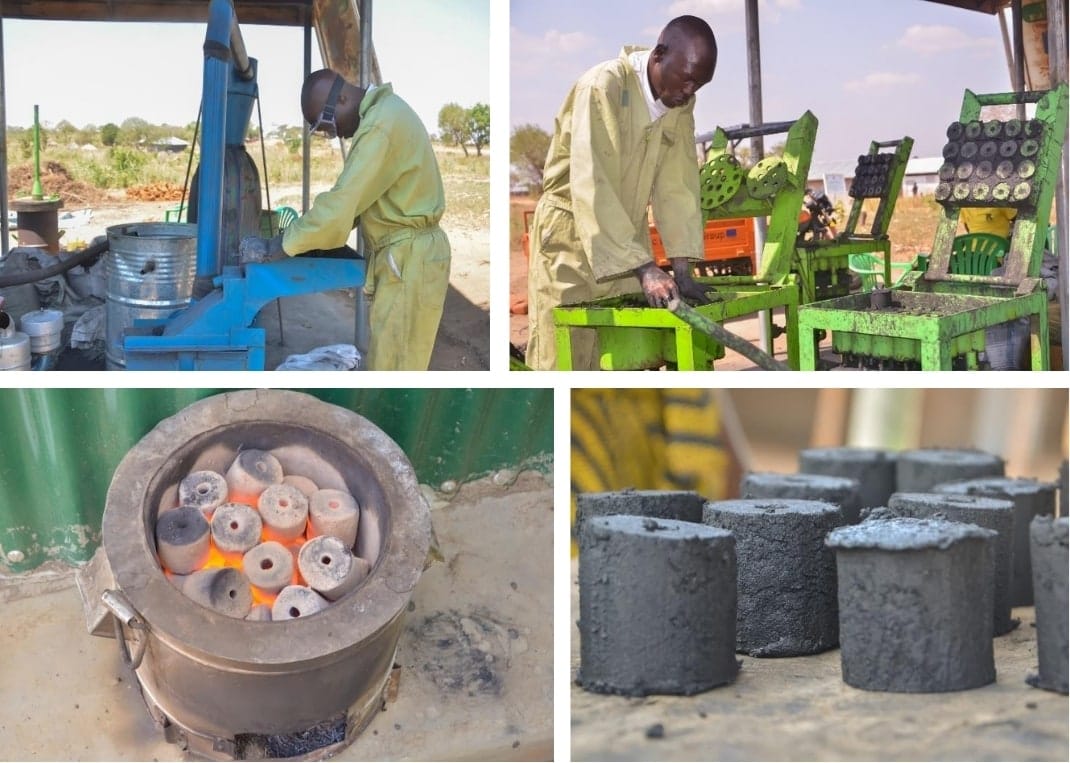
Trailing of FAECAL briquettes as an eco-friendly fuel source
1. Problem/gap being addressed:
Firewood and charcoal accounts for 82% of cooking fuel used by refugees in Uganda. For an already fragile environment the additional demand from an influx of tens or hundreds of thousands of refugees typically results in serious environmental degradation (including deforestation and loss of biodiversity). Competition for scarce resources is also a source of conflict between host communities and refugees and because the task of collecting firewood typically falls on women, apart from being a physically demanding and time consuming task, it exposes women and girls to risk of SGBV.
2. Solution:
Producing fuel briquettes made from organic waste within and around refugee camps has the potential to reduce the need to cut trees, generate employment and reduce the risk of conflict and gender based violence. Using sanitation waste (carbonised faecal sludge) as an ingredient in briquettes is a circular economy initiative linking the full sanitation value chain with livelihood opportunities the environment. If successful it could positively contribute to reducing sanitation service provision and have a positive economic and environmental impact.
3. Results:
Four women and youth refugee groups have been established and trained to produce briquettes. A feasibility study has confirmed there is a large potential market and wide acceptance and willingness to buy and use faecal sludge briquettes (FSBs). Project representatives went on an exposure visit to learn lessons from a successful scheme in Kenya (Nakuru – NAWASCO). This formed the basis of production in Uganda.
Through field trials a strong recipe for FSBs has been developed. The optimal ratio is 50% carbonised faecal sludge, 50% charcoal dust (or carbonised garden waste) bound together diluted molasses (20 L of water per 1.4kg of molasses – a higher faecal sludge content is more difficult to ignite and a lower content – is easier to ignite, burns for a shorter time and gives plenty of ash. FSB have a higher density and burn for upto 3 times longer than conventional charcoal.
Demand for FSBs exceeds supply. Production process uses manual presses which is slow and labour intensive. The production process is detailed here. Total estimated production (2,400 Kg) and sales in 2020 and 2021 is modest at UGX 1,800,000 ($492) and UGX 1,098,000 ($300) respectively. Production is currently too low to realise a meaningful return.
Apart from the technical manufacturing limitations, availability of raw materials has been a limiting factor both in terms of dried faecal sludge which in the absence of sludge drying beds is currently being imported from outside the camp, and biomass which is only seasonally available according to the cropping season. Competing time demands, varying levels of commitment and internal conflicts within groups cast major doubts as to whether a self-help group can make FSBs a viable business.
Currently the cost of briquette production (1,830 UGX/kg ($US0.5)) is almost double the cost of local traditionally produced charcoal (1000 UGX/kg ($US0.27)) which means it is not currently viable without continued subsidy.
Oxfam is exploring with WILDAid the market potential for FSBs as an eco-charcoal product targeting urban market (similar to what Sanivation have achieved in Kenya with its Eco Flame brand) which would enable a significantly higher profit margin. There is considerable interest and support from Government Authorities and UNHCR in this initiative.
4. Learning/applicability elsewhere:The size and shape of briquettes produced by the manual presses are larger than traditional charcoal and not compatible with commonly used stoves.
FS is being purchased and shipped in rather than utilising sludge from emptying latrines so FSBs are not currently contributing to camp sanitation programmes.
There are sufficient positives from this pilot to continue but a viable model is yet to be established that could be replicated or scaled elsewhere. The planned next phase will focus on improving efficiency and increasing production through mechanised and improving sourcing and storage of biomass. To achieve this a professional business and entrepreneurial skills are required.
5. Additional information: Project documents (Box)
As long as tree cutting and traditional charcoal production is allowed, which is cheap in the short term but environmentally damaging and unsustainable in the long term, FSBs will always struggle to compete cost wise. A key enabling factor would be the Government of Uganda introducing restrictions on unsustainable charcoal production. This would have a major impact equalising the costs between charcoal and briquettes or tipping it in favour of FSBs.
Water for People FSB manufacturing process
Contact person:
Brian McSorley, PHE Advisor, GHT, brian.mcsorley@angus-mcbride
Vincent Ogira, HSP PHE, GHT, Vincent.ogira@oxfam.org
